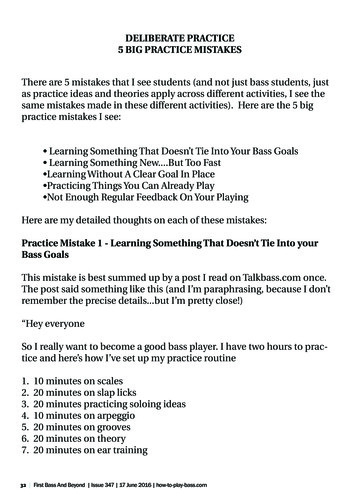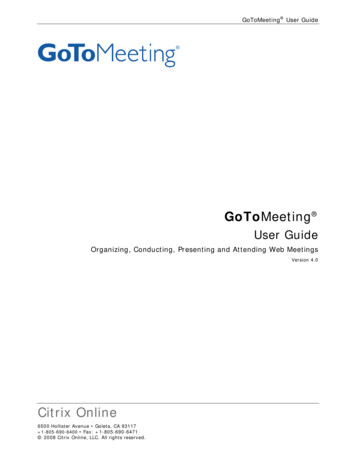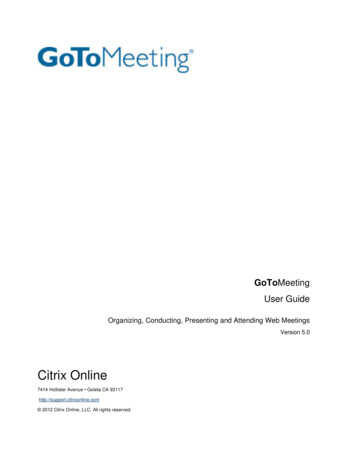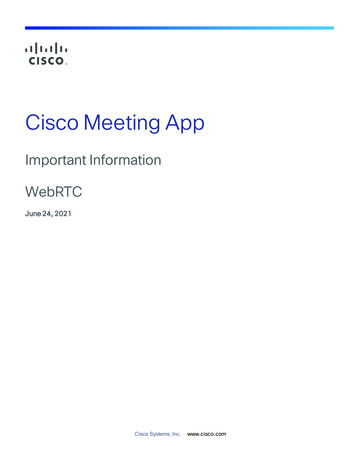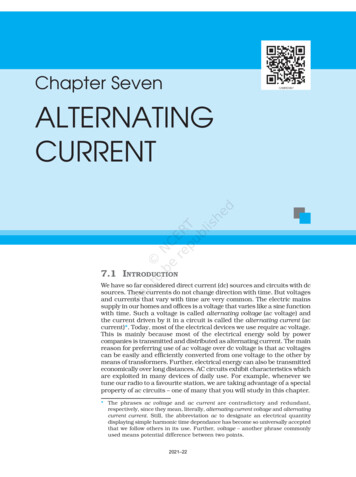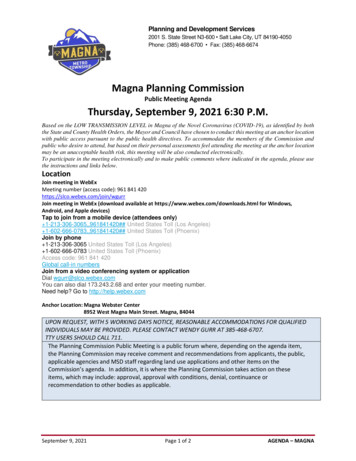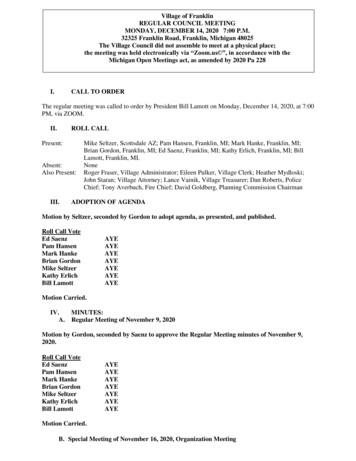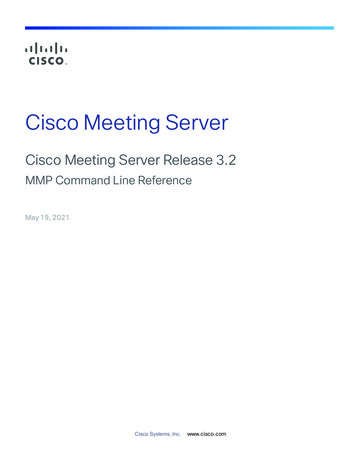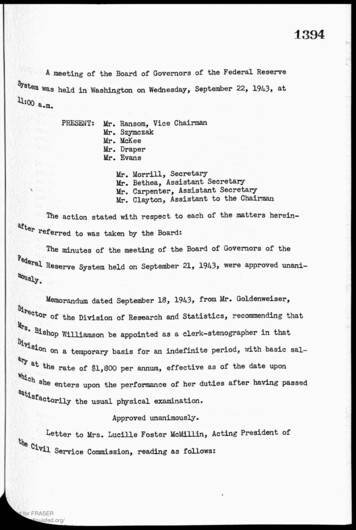
Transcription
1394A meeting of the Board of Governors of the Federal Reserve8Y8t"I was held in Washington on Wednesday, September 22, 1943, at11:00 a.m.PRESENT:Mr.Mr.Mr.Mr.Mr.Ransom, Vice , SecretaryBethea, Assistant SecretaryCarpenter, Assistant SecretaryClayton, Assistant to the ChairmanThe action stated with respect to each of the matters hereinreferred to was taken by the Board:The minutes of the meeting of the Board of Governors of thePecies"al Reserve System held on September 21, 1943, were approved unani-Memorandum dated September 18, 1943, from Mr. Goldenweiser,bire'or of the Division of Research and Statistics, recommending that"Ilra.BIshop Williamson be appointed as a clerk-stenographer in that4.un on a temporarybasis for an indefinite period, with basic salat therate of 1,800 per annum, effective as of the date uponShe enters upon the performance of her duties after having passed44,4factorily the usual physical examination.Approved unanimously.Letter to Mrs. Lucille Foster McMillin, Acting President ofCivil Service Commission, reading as follows:Digitized for FRASERhttp://fraser.stlouisfed.org/Federal Reserve Bank of St. Louis
13959/22/43-2-"This refers to your letter of August 30, 1943, inreply to the Board's letter of July 10, 1943, with regardto the proposal to amend the provisions of the RetirementSYstem of the Federal Reserve Banks so that employees ofthe Board of Governors of the Federal Reserve System instead of receiving the regular benefits provided by thatretirement system might receive benefits comparable tothose provided by the Civil Service Retirement System."We understand from your letter that the Commissionis in accord with our view that a provision of the pro4. 3ed amendment under which all employees hereafter en1)ering the Board's employ whether or not they have had'evious Government service would become members of thei etirement System of the Federal Reserve Banks would not?e inconsistent with the provisions of law relating tothe Civil Service Retirement System."In your letter, however, you point out that if allof the employees of the Board were excluded from coverageinder the Retirement System of the Federal Reserve Bankswould automatically become subject to the terms oftLie Civil Service Retirement Act and state that the Cornrequests that employees of the Board be excluded;1 rom the Retirement System of the Reserve Banks and thust!,brought under the Civil Service Retirement System. In."1.8 connection you state that there appears to be no'eason why employees of the Board should be subject toother retirement system than that applicable to Govern,sent employees generally and that it is believed essentialfl'om the standpoint of economy and efficient administration0 have only one retirement system under a unified adminlatration for all employees of the Government.ti"The Board of Governors has given careful thought tole:t suggestion contained in your letter and the considera 1 /18 upon which the suggestion is based. The Board does115.)t. believe, however, that these considerations are ap!licable with respect to employees of the Board, howeverljertinent they may be with respect to other groups of emPloyees."The Retirement System of the Federal Reserve Bankscoy.11, ere both the employees of the Board of Governors andemployees of the twelve Federal Reserve Banks andeir twenty-four branches. The staff of the Board of2Yernors consists of slightly less than 500 employees,?Jae the twelve Federal Reserve Banks and their twenty01,1r branches have somewhat more than 24,000 officersrlreDigitized for FRASERhttp://fraser.stlouisfed.org/Federal Reserve Bank of St. Louis
13969/22/43—3-and employees. Although the Federal Reserve Banks operate under the supervision of the Board of Governors,!rhe of their stock is now or ever has been owned by theunited States and their employees are not employees ofthe United States. The expenses of the Board of Governors,including salaries of its employees, are paid from fundserived from assessments on Federal Reserve Banks, andkiongress has never made any appropriations for such expenses."It is apparent, therefore, that the adoption ofrYour suggestion to bring the employees of the Board ofLmvernors under the Civil Service Retirement System couldresult in any saving or economy to the Government,.13c)tut ueuld, if anything, increase the Government's expense."The adoption of your suggestion would not resultth el imination of one retirement system, but merely inhe! e transfer of a relatively small group from one system0 the other. It is believed that the benefits to begained by continuing the participation of the Board'sle3mPl0yee5 in the Retirement System of the Federal Reserve.anks outweigh any possible advantages that might be gained111 bringing them under the Civil Service Retirement System.a"The operations of the Federal Reserve System are ofwitht,highlY specialized nature, and in filling positionsne Board or Federal Reserve Banks it has been found most:Iyantageous to utilize persons already experienced innls character of work. Accordingly, it is the policy r the Board of Governors to make the interchange of emPloYees between the Federal Reserve Banks and the Board8 free as possible from restrictions and to encourage:V further a career system for the officers and employeesthe Federal Reserve Banks and the Board of Governors.ellcier the Retirement System of the Federal Reserve Banks,tnIPloyees of the Board of Governors who are transferredt Positions with Federal Reserve Banks and employees oftr Reserve Banks who are transferred to positions withe Board retain credit in the Retirement System for theira evious service with the Board or the Banks and continue!e members of the System without interruption. However,tnloyees of the Board who have had previous service withFederal Reserve Banks would not receive credit for such;ervice if they became members of the Civil Service RetireSystem. The Board feels that it is highly important'flat there continue to be a free interchange of employees4Digitized for FRASERhttp://fraser.stlouisfed.org/Federal Reserve Bank of St. Louis
13979/22/43-4-"between the Federal Reserve Banks and the Board, unaffected by complications with respect to the continuationof retirement benefits."The Senate Committee report quoted in your letterrefers to the 'coordination and standardization' of retireTent systems. The proposal being advanced to provide with.n the framework of the existing Retirement System of theFederal Reserve Banks benefits for employees of the Boardcomparable to those provided by the Civil Service Retire'tent System would seem to be directly in line with thevlew expressed by the Congressional Committee regardingcoordination and standardization."For these reasons the Board feels that the continua.On of its employees as members of the Retirement Systemof the Federal Reserve Banks is in no way inconsistent withhe.interests of the Government or of the Civil Service'!!'etlrement System and is desirable in the interests of therederal Reserve System."Approved unanimously.OsLetters to the "State Bank of Howards Grove", Howards Grove, P.R #1, Sheboygan, Wisconsin, and the "Peoples State Bank", RockTexas, reading as follows:"The Board is glad to learn that you have completedarrangements for the admission of your bank to the!ederal Reserve System and takes pleasure in transmittingherewith a formal certificate of your membership."It will be appreciated if you will acknowledge receipt of this certificate."allApproved unanimously.Letter to Mrs. Hugh H. Clark, Norwich, New York, reading asroisiowe:"Senator Mead has asked us to write to you withreference to your letter to him dated September 21 1943,1 11ce it is the Board's Regulation W which deals with:4:"e matter discussed in your letter.Digitized for FRASERhttp://fraser.stlouisfed.org/Federal Reserve Bank of St. Louis
13989/22/43-5--"Regulation W prescribes certain restrictions on extensions of credit for the purchase of consumers' goods.i4,:s you know, the amount of goods available for purchaseV civilians is greatly curtailed and far short of theamount which the public could buy with its present largespending power. If people could inflate their presentincomes by obtaining as much credit as usual, the pressure in the direction of higher prices would be evengreater than it is today. Regulation Wis simply one f a number of things being done in the effort to 'holdthe line' in the fight against inflation."The Board appreciates and sincerely regrets thatthe regulation creates difficulties in some individualcases. But it is keenly aware of the fact that the fightagainst inflation is important in the war effort and that?Pon reflection all will recognize the necessity of makingtheir automobiles, refrigerators, washing machines, andclothing serve their purposes for a longer time than wascustomary in peacetimes."It is hoped that you may be able to solve your proble,m by running your present car somewhat longer or by reP-Lacing it with one which is not so high in price as theear you may have contemplated buying."Approved unanimously.Memorandum dated September 21, 1943, from Mr. Dreibelbis, Gen-oralAttorney,submitting the travel expense voucher of B. M. Wingfield,483istantGeneral Attorney, covering the period September 4 through8ePtember15, 1943, in connection with his trip to the Federal ReserveBkiat ofSan Francisco in regard to the investigation of Transamericae 110ora-ion, and recommending that, because a compartment was the only4cco4uLodation procurable at the time and it was necessary for him tobeSan Francisco at the earliest possible date, the Board approvetheParent of the additional expenditure covering the difference intoatOf a bedroom and compartment from Chicago to San Francisco.Digitized for FRASERhttp://fraser.stlouisfed.org/Federal Reserve Bank of St. LouisApproved unanimously.
Digitized for FRASERhttp://fraser.stlouisfed.org/Federal Reserve Bank of St. LouisThereupon the meeting adjourned.
1395 9/22/43 -2-"This refers to your letter of August 30, 1943, in reply to the Board's letter of July 10, 1943, with regard


